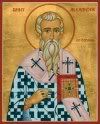If someone were to say that he does good and humane works outside of Christ, you know that those, his works, are spoiled to the core and are corroded, be it from vanity or be it from hidden selfishness. Man, without Christ, is the same as branches without the vine. He Himself told us this. The vine is hidden and unseen, but the branches are seen. Nevertheless, the grapes on the branch and the branch itself depends on the vine. The vine of all-encompassing good grows from the heart of God the Father and is watered by the sweetness of the Holy Spirit.
St. Nikolaj Velimirovic
If there is truth, there is inevitably love. … Love follows from the knowledge of God with the same necessity as light radiates from a lamp or nocturnal fragrance emanates from the open calyx of a flower: "knowledge becomes love he gnosis agape ginetai." Therefore, the mutual love of Christ's disciples is the sign of their learning, their knowledge, their walking in the truth. Love is the characteristic sign by which a disciple of Christ is recognized…
But one cannot make a greater error than to identify the spiritual love of one who knows the Truth with altruistic emotions and the striving for the "good of mankind," a striving that, at best, is grounded in natural sympathy or in abstract ideas. For "love" in this sense, which we call "Judaic," everything begins and ends in empirical works, the value of which is determined by their visible effect. But for spiritual love, or love in the Christian sense, this value is only tinsel. Even moral activity (philanthropy and so on) is, taken in itself, an absolute zero. What is desirable is not the outward appearance, not the "skin," of special activities, but life full of grace, which overflows in every creative act of a person. But "skin" as "skin," the empirical outward appearance as such, can always be falsified. No age dares to deny that there are "false apostles, deceitful workers, transforming themselves into the apostles of Christ," that even "Satan himself is transformed into an angel of light" (2 Cor. 11 13-14).
St. Pavel (Florensky)
Saturday, January 14, 2006
On "good works"
Subscribe to:
Post Comments (Atom)


No comments:
Post a Comment